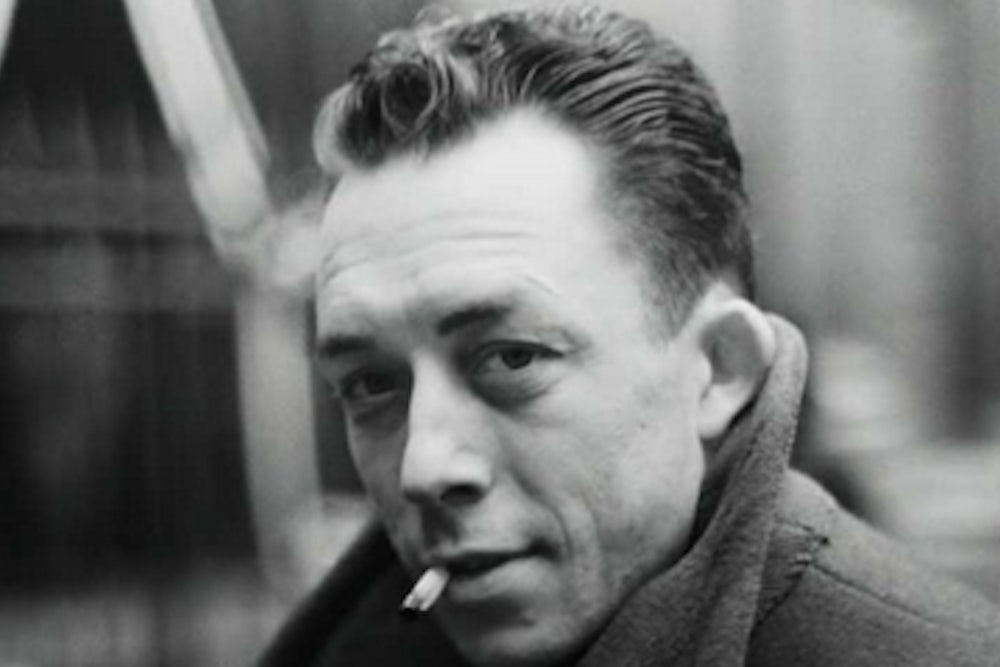Albert Camus would have celebrated his 100th birthday this week. Judging from how he documented his birthdays, it probably would not have been a particularly happy affair: his journals reveal an author ill at ease with a world that, for him, signified nothing. On his birthdays, Camus's thoughts often turned to death and, perhaps appropriately, to the works he had yet to write:
November 7. [1938 - 25 years old]
Character. A.M. — an invalid —both legs amputated — paralyzed all down one side.
“They help me when I want to relieve myself. They wash and wipe me. I’m practically deaf. But I would never do a thing to cut short a life in which I believe so strongly. I would accept even worse, blindness, deprivation of all my senses, loss of the power of speech and of any contact with the external world — as long as I could feel within me this dark, burning flame which is me and me alive. And I should still give thanks to life for having let me continue to burn with its flame.” [From Camus's A Happy Death]
November 1939 [26 years old]:
Letter to a man in despair.
...How, in fact, can we avoid falling into despair? Those we love have often been in danger before, from illness, death or madness, but we ourselves and the things we believe in have still lived on. Often, the values on which our life is built have almost collapsed. But never before have these values and those we love been threatened all together and all at the same time. Never before have we been so completely handed over to destruction.
November — Thirty-two years old [1945]
“Man’s most natural inclination is to ruin himself and everyone with him. What exceptional efforts he must make to be merely normal! And what an even greater effort for anyone who an ambition to dominate himself and to dominate the mind. Man is nothing in himself. He is but an infinite chance.”
November 7, 1954.
41 years old.
The Bacchae.
In Sicily. Now. A small village in the Palermo region. And everything has the same pleasantness. Very important works in view. In any case, there remains something of it. Ex: Don Juan, Faust, they’re all part of it.
November 7, 45 years old. [1958]
How I wanted a day of solitude and reflection. beginning now, this detachment will be realized at fifty. That day, I will reign.
Democracy is not the rule of the majority but the protection of the minority.
Camus never lived to see the day he would reign. In 1960, he and his friend Michel Gallimard were killed in a car crash in France; Camus was 46 years old. We know him best by the works he left behind, by his oblique journal entries and a handful of biographies, and by Henri Cartier-Bresson’s iconic image of him, looking skeptically at the lens with a cigarette protruding from parted lips.
But a new biography of Camus by Robert Zaretsky, A Life Worth Living: Albert Camus and the Quest for Meaning (Harvard University Press), suggests that these accounts don't give us the full story of the man. Published Thursday, on Camus' birthday, A Life Worth Living departs from the chronological approach that Zaretsky took in his first work on Camus, Elements of a Life, in 2010. Instead, Zaretsky tells the author’s story according to the five themes that preoccupied his life and work: absurdity, silence, measure, fidelity, and revolt. The result is a much more human portrait of a man whose life is often reduced to a meditation on the bleakness of absurdism. By chronicling the ideas rather than the events of Camus's life, Zaretsky shows that "Camus was all too human: an obvious point that our desperate need for heroes, especially now, often obscures.”
In his closing remarks, Zaretsky leaves us with an image of Camus that is indeed all too human—colorful and spontaneous and uneasy and imperfect. This, he writes, is probably how Camus would have wanted to be remembered.
But the image he would want us to take away, perhaps, is not a black-and-white shot captured by Cartier-Bresson. Instead, it is a scarcely known photograph, taken for a French weekly magazine, of Camus and his close friend Michel Gallimard not long before the car crash that took their lives. In a portrait awash in Mediterranean colors, the two men are sitting at a café terrace at a table covered with plates and bottles. Gallimard, wearing a reddish stubble and shy smile, seems in mid-sentence, while Camus, one arm over his friend’s shoulder, the other poised under his chin, looks slightly to the camera’s right, his sun-tanned face alight with a broad smile. Gazing at the portrait, a line from "Nuptials at Tipasa" surges into my thoughts: "Everything here leaves me intact, I surrender nothing of myself, and don no mask: learning patiently and arduously how to live is enough for me."
